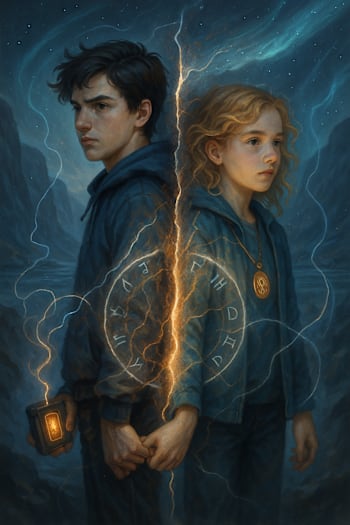Time travel doesn’t just bend history in The Portal Walker Series—it bends the space between a brother and sister. Jake and Emma Parker aren’t merely co-protagonists; they’re a feedback loop. Each jump refracts their bond through new pressures—guilt, protection, and the slippery question of who they are when yesterday can be revised and tomorrow might erase them.
The first oath: “We go together”
Their bond begins with a rule disguised as banter. He builds the portal; she buckles it to real life. Jake says he’ll go alone. Emma slides the necklace into the anchor and says, without ceremony, No you won’t. That tiny act—fingers closing over his on the touchpad—reads as teenage stubbornness, but it’s an oath. Time travel magnifies it: once you’ve crossed a century with someone’s pulse in your grip, “together” stops being preference and becomes physics.
Protection vs. autonomy (and why both are right)
Jake’s protective instinct is a feature, not a flaw. He’s the planner who tries to out-calculate catastrophe, especially after one timeline taught him what losing Emma feels like. The paradox is obvious: protection requires control; a time stream punishes control.
Emma’s autonomy answers him in kind. She’s not “the brave kid sister”; she’s the strategist who reads rooms, cultures, and the timing of a single word. In Athens she dials down a mob by leaning into lost, not dangerous. In that instant, their roles invert: his device translates, but her choice of message saves them. The series keeps doing this—tilting the stage until they must trade places. Protection and autonomy aren’t competing values; they’re alternating currents.
Guilt as a time loop
Guilt behaves like a looped track that won’t stop playing. Jake carries the “I should’ve seen it coming” version—classic builder’s remorse. Every fix spawns an if-only. Emma’s guilt is quieter: If I hadn’t pushed to stay by his side, would he be safer? Time travel sharpens both, because mistakes can echo across empires. A wrong boast at a symposium becomes a rumor, becomes a decree, becomes a city at your throat. The scale of consequence tempts them toward extremes—Jake to over-manage, Emma to self-erase. Their growth is learning to break the loop by naming it out loud.
Identity under revision
Who are you when context won’t hold still? In Waltham, “Wizard Jake” is a joke; in Athens, it’s a political category. In Sparta, it’s worth less than a good spear stance. Emma toggles identities faster: apprentice, interpreter, diplomat, runner. The constant is not a costume but a compass—what each of them values when the surrounding value system flips.
A turning point arrives after the Oracle’s rebuke—Jake’s confidence punctured by visions of failure, Emma validated as the necessary brake he kept ignoring. He’s forced to put down the mantle of invincibility; she’s asked to pick up authority without apology. Both changes are less makeover than unveiling. Time didn’t overwrite them; it stripped them down to core settings.
The cost of being “the older one”
Older siblings know this script: you learned the stove was hot, so you put your hand over it when your sister reaches. Now add a portal. Jake’s birth-order wiring meets temporal escalation: he’s not just keeping Emma from a burn; he’s guarding her from eras. That pressure warps judgment. It also breeds tenderness in the small spaces—him checking the rig’s logs while pretending not to watch her win over a room; her feigning annoyance while quietly carrying half his weight on a bad ankle. In a story loud with prophecy and factions, their care survives in micro-gestures. That’s the point: epics are carried by tiny, consistent choices.
The argument they need to keep having
Their best fights are about method, not mission. She says, be smart about how much you show. He says, we don’t have time for tiptoeing. Both are correct in different rooms. What changes is the latency between mistake and admission. Early on, Jake’s pride makes that latency long; later, he compresses it—I didn’t think; I’m listening. Emma mirrors the move, owning when caution curdles into fear. This is how the bond evolves: not toward agreement, but toward faster repair.
Hope, on purpose
Time travel can flatten people into pawns of causality. Jake and Emma refuse that. They keep planting small hopes that don’t require the timeline’s permission: a solved aqueduct, a scholar’s escape, a fig split three ways by a stream. These choices don’t erase the grand machinery; they humanize it. Hope isn’t a mood for them; it’s maintenance.
Why their bond matters to the series engine
A portal story collapses without emotional ballast. The siblings are that ballast. Their dynamic turns abstract themes into stakes you feel in your chest. Guilt is not an essay; it’s the tremor in Jake’s hand before he powers up. Protection is not a trope; it’s Emma stepping to a doorway first. Identity isn’t a thesis; it’s which name you answer to when a city calls you monster or savior.
Across timelines, their bond keeps choosing: to translate before shouting, to listen before fixing, to apologize before the timeline forces it. That’s the arc—the widening of what “together” can hold. Not dependency. Not distance. A practiced relay between two people who keep handing each other the right tool at the right moment, even when that tool is the word stop.
In a universe that keeps rewriting the rules, Jake and Emma make one rule that survives every draft: We are not leaving the other behind. Time can stretch it, test it, punish it—but it can’t break it without breaking the story itself. And that, more than any artifact, is the engine that keeps the portals open.
